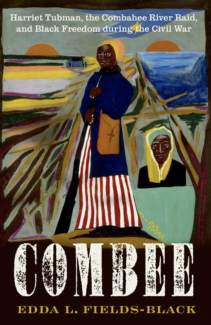
From the Pulitzer Prize website: The 2025 Pulitzer Prize Winner in History
Winning Work
Combee: Harriet Tubman, the Combahee River Raid, and Black Freedom During the Civil War
By Edda L. Fields-Black
The story of the Combahee River Raid, one of Harriet Tubman's most extraordinary accomplishments, based on original documents and written by a descendant of one of the participants.
Publishers Weekly Starred Review
Library Journal Starred Review
Booklist Top Ten History Books of 2024
Most Americans know of Harriet Tubman's legendary life: escaping enslavement in 1849, she led more than 60 others out of bondage via the Underground Railroad, gave instructions on getting to freedom to scores more, and went on to live a lifetime fighting for change. Yet the many biographies, children's books, and films about Tubman omit a crucial chapter: during the Civil War, hired by the Union Army, she ventured into the heart of slave territory--Beaufort, South Carolina--to live, work, and gather intelligence for a daring raid up the Combahee River to attack the major plantations of Rice Country, the breadbasket of the Confederacy.
Edda L. Fields-Black--herself a descendent of one of the participants in the raid--shows how Tubman commanded a ring of spies, scouts, and pilots and participated in military expeditions behind Confederate lines. On June 2, 1863, Tubman and her crew piloted two regiments of Black US Army soldiers, the Second South Carolina Volunteers, and their white commanders up coastal South Carolina's Combahee River in three gunboats. In a matter of hours, they torched eight rice plantations and liberated 730 people, people whose Lowcountry Creole language and culture Tubman could not even understand. Black men who had liberated themselves from bondage on South Carolina's Sea Island cotton plantations after the Battle of Port Royal in November 1861 enlisted in the Second South Carolina Volunteers and risked their lives in the effort.
Using previous unexamined documents, including Tubman's US Civil War Pension File, bills of sale, wills, marriage settlements, and estate papers from planters' families, Fields-Black brings to life intergenerational, extended enslaved families, neighbors, praise-house members, and sweethearts forced to work in South Carolina's deadly tidal rice swamps, sold, and separated during the antebellum period. When Tubman and the gunboats arrived and blew their steam whistles, many of those people clambered aboard, sailed to freedom, and were eventually reunited with their families. The able-bodied Black men freed in the Combahee River Raid enlisted in the Second South Carolina Volunteers and fought behind Confederate lines for the freedom of others still enslaved not just in South Carolina but Georgia and Florida.
After the war, many returned to the same rice plantations from which they had escaped, purchased land, married, and buried each other. These formerly enslaved peoples on the Sea Island indigo and cotton plantations, together with those in the semi-urban port cities of Charleston, Beaufort, and Savannah, and on rice plantations in the coastal plains, created the distinctly American Gullah Geechee dialect, culture, and identity--perhaps the most significant legacy of Harriet Tubman's Combahee River Raid.
Biography
Edda L. Fields-Black is the author of Deep Roots: Rice Farmers in West Africa and the African Diaspora and was executive producer and librettist of Unburied, Unmourned, Unmarked: Requiem for Rice (with Emmy® Award-winning composer John Wineglass), reflecting her long involvement with the interconnective story of rice cultivation in pre-colonial West Africa and on antebellum Lowcountry South Carolina and Georgia plantations. She has been a consultant at the Smithsonian National Museum of African American History and Culture, the International African American Museum, and the Senator John Heinz History Center. Fields-Black lives with her family in Pittsburgh, where she teaches history at Carnegie Mellon University.
Dr. Fields-Black earned her PhD at the University of Pennsylvania, 2001.
Congratulations, Professor Fields-Black!
